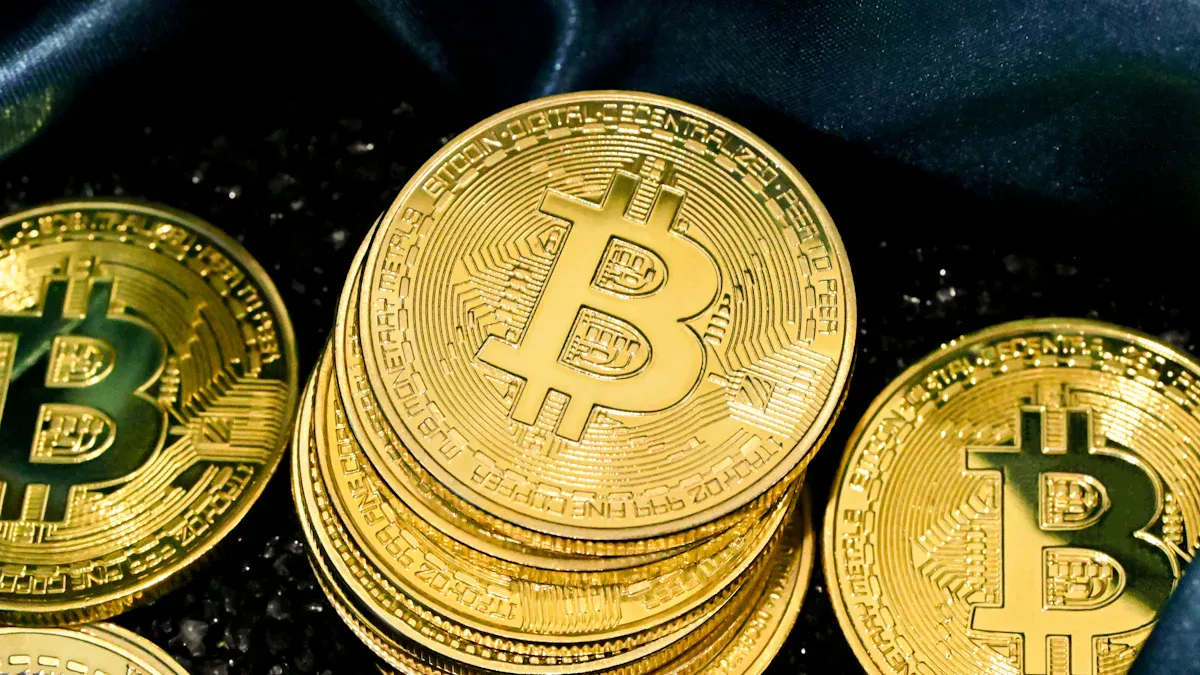Which Cryptocurrency Is Often Called Digital Gold?
2025-02-27 08:00:50Which Cryptocurrency Is Often Called Digital Gold?
Bitcoin is often referred to as "digital gold" due to its scarcity, decentralized nature, and role as a store of value. With a fixed supply of 21 million coins, Bitcoin mirrors gold’s finite availability, making it a hedge against inflation and economic instability.
Unlike traditional currencies, Bitcoin operates on blockchain technology, ensuring security and transparency. Its growing adoption by institutional investors further strengthens its reputation as a modern alternative to gold, solidifying its position as a trusted asset for wealth preservation in the digital era.
Similarities Between Bitcoin and Gold

Scarcity and Limited Supply
Bitcoin and gold share a defining characteristic: scarcity. Gold's supply depends on natural resources and mining, making it finite but variable. Bitcoin, on the other hand, has a fixed supply of 21 million coins, determined by its algorithm. This predictable scarcity sets Bitcoin apart from other assets. Halving events, which occur approximately every four years, reduce the rate of new Bitcoin entering circulation. These events mirror the challenges of extracting gold, where mining becomes more difficult over time.
Asset | Supply Mechanism | Scarcity Type |
|---|---|---|
Gold | Limited by natural resources and mining | Finite but variable |
Bitcoin | Algorithmically capped at 21 million | Fixed and predictable |
Both Bitcoin and gold derive their value partly from their limited availability. This scarcity positions them as potential hedges against inflation, appealing to investors seeking long-term value preservation.
Store of Value and Wealth Preservation
For centuries, gold has been a trusted store of value. Its durability and universal acceptance have made it a cornerstone of wealth preservation. Bitcoin, introduced in 2009, offers a modern alternative. Its digital nature allows for portability and ease of transfer, unlike gold, which is cumbersome to transport.
Bitcoin's decentralized framework enables users to control their funds without relying on traditional financial systems. In countries like Venezuela, where hyperinflation has devalued local currencies, Bitcoin has helped individuals safeguard their wealth. These attributes make Bitcoin comparable to gold in its role as a store of value, especially during economic crises.
Safe-Haven Asset Status During Economic Uncertainty
Bitcoin and gold often attract investors during periods of economic instability. Gold has long been considered a reliable safe-haven asset due to its stability and liquidity. Bitcoin, while more volatile, has shown potential in specific financial environments. For example, during the COVID-19 pandemic, Bitcoin gained attention as a hedge against market volatility.
However, Bitcoin's performance as a safe haven remains inconsistent. Its volatility and liquidity issues can undermine its reliability compared to gold. Despite these challenges, Bitcoin continues to evolve as an alternative safe-haven asset, particularly in regions where traditional financial systems face instability.
Differences Between Bitcoin and Gold
Physical vs. Digital Nature
Bitcoin and gold differ fundamentally in their nature. Gold is a tangible asset with a physical presence, while bitcoin exists only in digital form. This distinction impacts their portability and divisibility. Bitcoin can be transferred instantly across borders and divided into tiny units called satoshis. Gold, on the other hand, is heavy and cumbersome to transport, requiring specialized tools for division.
Attribute | Bitcoin | Gold |
|---|---|---|
Tangibility | Intangible, existing only digitally | Physical asset with a tangible presence |
Portability | Easily transferable, stored digitally | Heavy and bulky, difficult to store |
Divisibility | Highly divisible into satoshis | Can be divided but requires specialized tools |
Bitcoin's digital nature also allows for faster transactions compared to the logistical challenges of moving gold. These differences make bitcoin more accessible for modern, tech-savvy investors.
Volatility and Price Stability
Bitcoin and gold exhibit contrasting price behaviors. Bitcoin is highly volatile, with dramatic price swings influenced by market sentiment and regulatory news. For instance, its price surged past $60,000 in 2021 before dropping by over 50%. Gold, in contrast, has a long history of stability, often serving as a hedge against inflation and economic uncertainty.
Bitcoin's price can fluctuate by ±10% within hours.
Gold's stability makes it a reliable store of value during economic downturns.
Bitcoin's high volatility offers potential for high returns but comes with significant risk.
Asset | Volatility | Stability |
|---|---|---|
Bitcoin | High | Low |
Gold | Low | High |
While bitcoin appeals to speculative investors, gold remains a safer choice for those seeking long-term stability.
Regulatory Environment and Accessibility
Gold operates within a well-established regulatory framework, recognized globally as a commodity. Bitcoin, however, faces regulatory uncertainty due to its decentralized nature. Its legal status varies by country, with some treating it as property rather than currency.
Gold transactions are less prone to fraud due to certified brokers.
Bitcoin's lack of universal regulation creates potential legal challenges for investors.
Regulatory clarity for bitcoin is still evolving, with oversight focusing on anti-money laundering and licensing.
Bitcoin's digital nature enhances its accessibility, allowing for microtransactions and cross-border transfers. Gold, while stable, is less convenient for small-scale or international transactions. These differences highlight the unique challenges and opportunities of bitcoin vs gold in the modern financial landscape.
Bitcoin as a Hedge Against Inflation and Economic Uncertainty

Historical Performance in Economic Crises
Bitcoin's performance during economic crises has been mixed, reflecting both its potential and its volatility. During the COVID-19 pandemic in 2020, bitcoin's price dropped to approximately $4,000 in March but rebounded to nearly $29,000 by the end of the year. This recovery demonstrated resilience in a time of global uncertainty. However, during the 2022 Russia-Ukraine conflict, bitcoin started at $40,000 and fell to $17,000, showing less stability in the face of geopolitical tensions.
Bitcoin's role as a hedge against inflation often depends on the context. It has performed better during national crises than global ones. For example, during COVID-19, bitcoin exhibited increased volatility but ultimately gained value. In contrast, gold has consistently served as a safe-haven asset, with a history of stability during economic downturns.
Role in Diversifying Investment Portfolios
Bitcoin offers unique benefits for diversifying investment portfolios. As a high-risk, high-reward asset, it complements traditional investments like bonds and dividend stocks. These traditional assets provide stability and steady income, balancing the volatility of cryptocurrencies. Investors can also pair bitcoin with low-cost index funds, ETFs, or diversified mutual funds to achieve long-term growth while mitigating risks.
Including bitcoin in a portfolio can enhance returns and provide diversification benefits. Its correlation with inflation changes makes it a potential hedge against inflation. However, investors must assess their risk tolerance and financial goals before integrating bitcoin into their portfolios.
Risks and Challenges of Bitcoin as a Hedge
Despite its potential, bitcoin faces significant challenges as a hedge against inflation. Its extreme price swings can result in substantial losses, with the cryptocurrency sometimes losing over 50% of its value in short periods. For instance, bitcoin's value plummeted by more than 60% during a spike in U.S. inflation in 2022, raising doubts about its reliability as a store of value.
Regulatory uncertainty also affects bitcoin's stability and investor confidence. Policies restricting access to bitcoin, such as limitations on exchanges, can hinder its use as a hedge against inflation. Additionally, bitcoin has shown correlation with equities during market selloffs, undermining its role as a hedge during liquidity crises. These factors highlight the risks associated with relying on bitcoin for wealth preservation.
Bitcoin earns the title of "digital gold" due to its scarcity, decentralized framework, and role as a store of value.
Argument Type | Bitcoin | Gold |
|---|---|---|
Supply | Limited supply of 21 million coins | Scarcity in the Earth's crust |
Nature | Digital asset, stored in virtual wallets | Physical asset, requiring secure storage |
Volatility | Highly volatile | More stable price |
Both assets attract investors during economic instability. Bitcoin's digital convenience and capped supply align it with gold's scarcity. However, its volatility and evolving regulations spark debate.
Bitcoin's potential as a hedge against inflation grows with institutional adoption.
Individual perspectives shape its perception, influenced by risk tolerance and market dynamics.
Whether Bitcoin fully replaces gold depends on future developments and societal shifts toward digital assets.
FAQ
What makes Bitcoin different from traditional currencies?
Bitcoin operates on blockchain technology, ensuring decentralization and transparency. Unlike traditional currencies, it has a fixed supply of 21 million coins, preventing inflation.
Why is Bitcoin called "digital gold"?
Bitcoin shares key traits with gold, such as scarcity and its role as a store of value. Its decentralized nature and limited supply reinforce this comparison.
Can Bitcoin fully replace gold as a safe-haven asset?
Bitcoin's volatility and regulatory challenges limit its reliability compared to gold. However, its growing adoption suggests potential as a complementary safe-haven asset.
Tip: Diversify investments by combining Bitcoin and gold to balance risk and stability in uncertain economic times.